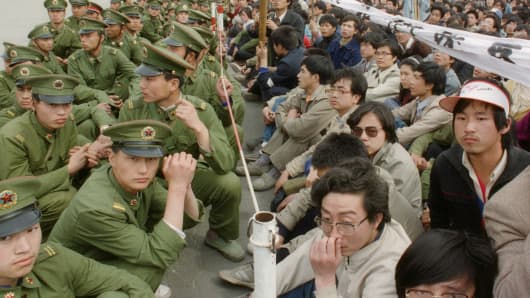In China, one of the greatest economic transformations in history is taking place, as millions move from poverty into the middle class. But, ironically, just as they start earning enough to lead a life of some comfort, the Chinese are growing frustrated with income inequality. Luxury brands and millionaires are proliferating, while many average citizens believe they are not getting their fair share of the economic spoils. Increasingly, the Chinese see their country as one of haves and have-nots.
Sound familiar? The same 1 percent versus 99 percent divide that has become a political current in the U.S. is bound to have its global moment as the worldwide middle class rises.
China isn't the only emerging nation with this type of problem. Concerns about inequality are common in many countries, and the recent street protests in Brazil and Turkey illustrate how economic success can spawn middle-class aspirations and demands, as well as capacities for demanding political change.
China is obviously very different from Brazil and Turkey, and mass demonstrations in the People's Republic are unlikely anytime soon, but it is clear that the Chinese middle class is growing restless, too. It's not certain yet how these emerging issues will manifest themselves in Chinese politics, but they eventually may prove a cause for concern among that nation's 1 percent.
(Read more: Why China goes crazy on Singles Day)
Despite the rising worries about inequality, no one can deny China's economic success over the past three decades. Though the country's growth rate is now slowing, at 7.5 percent it remains the envy of most nations. And overall, the people are pleased with the economic situation. In a Pew Research Center poll conducted this spring, 88 percent said the national economy was in good shape.
Moreover, the Chinese overwhelmingly recognize how much they have advanced economically—in a 2012 Pew Research survey, 92 percent said they are doing better financially than their parents' generation, the highest percentage among the 21 nations polled. And there is considerable optimism about the future, with 82 percent saying that the current generation of children will be better off than their parents.
The material trappings of success are increasingly common in China, especially in major cities, where car ownership and real estate prices have soared. As incomes rise, well-heeled consumers are developing an appetite for imported luxury goods. According to the management consulting firm McKinsey, by 2015 "one-third of the money spent around the world on high-end bags, shoes, watches, jewelry, and ready-to-wear clothing will come from Chinese consumers."
(Read more: Why keeping up with the Joneses just got tougher)




